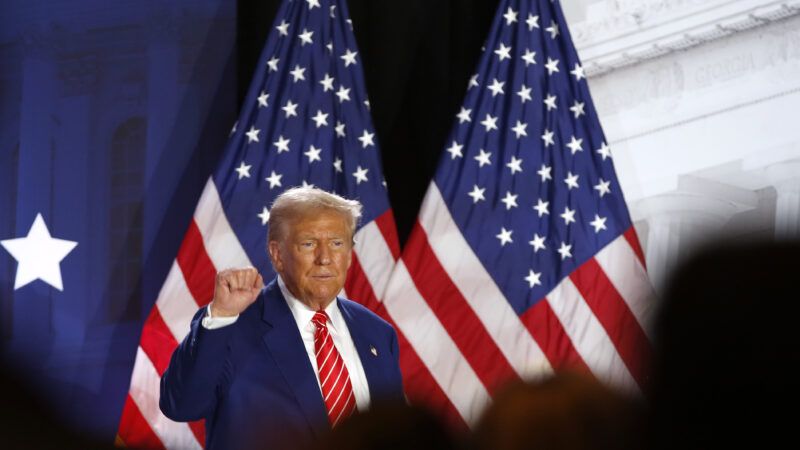'Sometimes You Need a Strongman,' Trump Declares
The former president's attempts to put a positive spin on the term are consistent with his alarmingly authoritarian instincts.

During his Fox News interview with Sean Hannity on Wednesday night, Donald Trump bragged about Hungarian Prime Minister Viktor Orbán's "respect" for him. "They say he's a strongman," Trump said. "Sometimes you need a strongman. He's a strongman."
Since Orbán is not known as a circus performer, Trump's meaning was clear. He was referring to the political version of strongman, variously defined as "a leader who rules by the exercise of threats, force, or violence"; "one who leads or controls by force of will and character or by military methods"; or someone who "has great power and control over his country, although his methods may sometimes be violent or morally wrong." As has long been clear, these are qualities that Trump admires.
Orbán, a self-described proponent of "illiberal Christian democracy," was elected to his third consecutive term as Hungary's prime minister in 2022. Trump endorsed Orbán's reelection, praising his "strong leadership." At a rally last January, he called Orbán "a very great leader" and "a very strong man." Although "some people don't like him because he's too strong," Trump added, "it's nice to have a strongman running the country."
How has Orbán demonstrated his strength? "Since taking power in the 2010 elections," Freedom House notes, Orbán's party, Fidesz, "has pushed through constitutional and legal changes that have allowed it to consolidate control over the country's independent institutions." Those changes have included "antimigrant and anti-LGBT+ policies," attempts to undermine judicial review, and "laws that hamper the operations of opposition groups, journalists, universities, and nongovernmental organizations" that "are critical of the ruling party or whose perspectives Fidesz otherwise finds unfavorable."
Last December, the Hungarian government "enacted the controversial Defense of National Sovereignty Act, which provides for the creation of a National Sovereignty Defense Office with vaguely defined yet extensive powers to investigate and report on any activity suspected of serving foreign interests," Freedom House adds. "Rights defenders have expressed fear that the law will empower authorities to target anyone critical of the government." Overall, the organization gives Hungary a score of 65 out of 100 for political rights and civil liberties, making it "partly free."
That is pretty good compared to North Korea (3), China (9), and Russia (13), all of which were rated as "not free" in 2023. But it is not so good compared to most of Europe, where countries typically were rated as "free," with scores ranging from 78 (Bulgaria) to 100 (Finland). According to Freedom House, Hungary was also considerably less free than Canada (97), Australia (95), and the United States (83).
You may take issue with some of Freedom House's criteria or the way they are applied. But Trump is not arguing that Orbán, a hero to many American conservatives, has been unfairly maligned as a "strongman." He is arguing that the term's negative connotation is misleading, because "sometimes you need a strongman."
That attitude is consistent with Trump's generally authoritarian instincts, including his presentation of himself as a uniquely effective leader who gets things done by projecting strength; his admiration of foreign autocrats in countries such as China, Russia, and the Philippines; his disregard for election results, civil liberties, and constitutional constraints on executive power; his conflation of progressives with communists (a rhetorical habit he shares with Orbán); his assertion of sweeping presidential immunity from criminal charges; and his reflexive opposition to holding police officers accountable when they abuse their powers. One need not succumb to "Trump derangement syndrome" or invoke Nazi analogies to find these tendencies deeply troubling.


Show Comments (90)